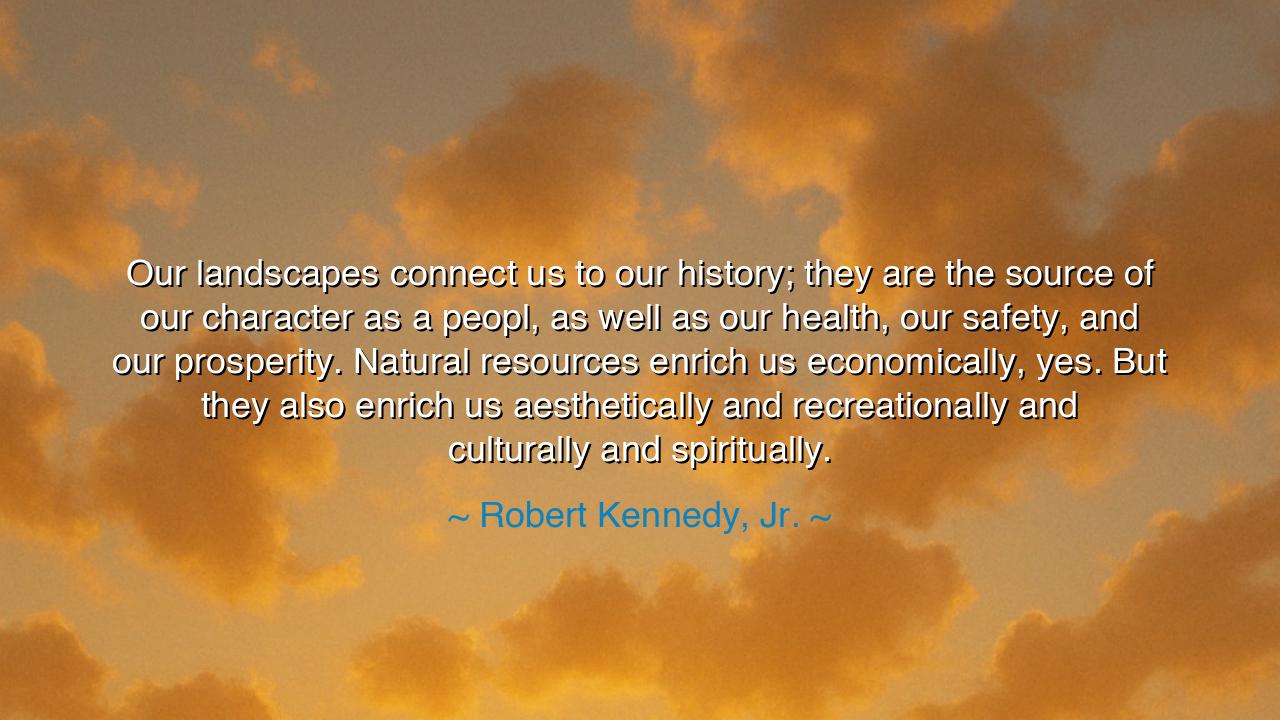
Our landscapes connect us to our history; they are the source of
Our landscapes connect us to our history; they are the source of our character as a peopl, as well as our health, our safety, and our prosperity. Natural resources enrich us economically, yes. But they also enrich us aesthetically and recreationally and culturally and spiritually.






The words of Robert F. Kennedy, Jr. flow with the power and beauty of an ancient river: “Our landscapes connect us to our history; they are the source of our character as a people, as well as our health, our safety, and our prosperity. Natural resources enrich us economically, yes. But they also enrich us aesthetically and recreationally and culturally and spiritually.” In this declaration, Kennedy does not merely speak of landscapes or resources—he speaks of the very soul of a nation, and of humanity’s bond with the living earth that bore it. He reminds us that the forests, the rivers, the mountains, and the open sky are not commodities to be consumed, but sacred mirrors reflecting who we are, who we have been, and who we may yet become.
In the ancient world, the bond between man and nature was never questioned. The farmer who sowed his seeds in the Nile’s fertile soil, the shepherd who led his flock through the green valleys of Greece, and the tribesman who prayed to the wind on the American plains—all knew that their fate was tied to the land beneath their feet. To harm it was to harm themselves. Kennedy’s words echo this timeless truth: that our landscapes are not background scenery, but the stage upon which our destiny unfolds. They hold the memory of our ancestors and the promise of our descendants. A river is not just water—it is the flow of time, connecting generations as it carves through stone.
Kennedy, an environmental advocate and heir to one of America’s most storied families, spoke these words to awaken the conscience of a world grown forgetful. In his lifetime, he watched as forests fell, oceans darkened, and air thickened with smoke. Yet he understood that to speak of the environment was not to speak merely of trees and fish—it was to speak of the human spirit. For what is a people who have lost their mountains, their rivers, their wild spaces? They become rootless, detached, and weary of the very world that sustains them. The landscape is our teacher, our healer, and our home.
There is an old story of Chief Seattle, who said to the settlers long ago: “The earth does not belong to man; man belongs to the earth.” His words, like Kennedy’s, carry a warning wrapped in reverence. When people forget their bond with nature, they lose not only balance but identity. The forests that once inspired poets become timber; the rivers that once gave life become drains; the mountains that once stirred awe become obstacles to be leveled. And with every act of thoughtless destruction, a part of our spirit is diminished. The wealth we gain in gold or oil is poor exchange for the beauty and wholeness we lose.
Yet Kennedy reminds us that the land gives more than material wealth—it gives joy, wonder, and peace. The laughter of children running through a meadow, the stillness of a dawn over the sea, the exhilaration of a climb to a mountain’s peak—these are riches that no treasury can hold. The aesthetic and spiritual enrichment that nature provides cannot be measured in coin, yet they sustain the soul far more deeply. From the ancient temples of Delphi to the redwoods of California, humanity has always turned to nature to remember what is divine. The tree is not only wood—it is a symbol of life’s persistence. The ocean is not only water—it is the breath of the earth itself.
To care for the landscape, then, is to care for our very being. The destruction of nature is not an act of power, but of forgetfulness. The ancients built their temples from stone, not to dominate the mountains, but to honor them. So too must we rebuild our reverence. Let us plant trees where forests have fallen, clean the waters where they have darkened, and teach our children that the land is not a resource, but a relative. For every act of care, however small, restores the ancient harmony between humanity and the world that cradles it.
The lesson, then, is simple but profound: remember your roots in the earth. Walk not as a conqueror upon the land, but as a steward. Take what you need, but give back what you can. Let your work be guided by gratitude, not greed; your progress by wisdom, not haste. When you look upon a mountain, remember that it shaped the character of your ancestors; when you drink from a stream, remember that it nourished those who came before. For as Kennedy teaches, the landscape is not only our economy—it is our history, our health, our culture, and our spirit.
Thus, let this truth be passed down to future generations: the land does not serve us—it sustains us. To live without reverence for nature is to live without reverence for life itself. When we honor the earth, we honor the story of our own becoming. And when we care for it—its rivers, its trees, its wind and sky—we keep alive the eternal covenant between mankind and creation. For in the end, the land remembers us, even when we forget ourselves.






AAdministratorAdministrator
Welcome, honored guests. Please leave a comment, we will respond soon